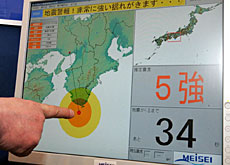Swiss urge action following disaster summit

An international conference in Kobe, Japan, has adopted an action plan to reduce deaths and damage caused by natural disasters following the Asian tsunami.
Swiss delegates were generally positive about the outcome, but said words had to be translated into deeds as soon as possible.
Experts and officials at the United Nations-sponsored conference, which ended on Saturday, agreed on the need to make disaster preparation a priority.
They also made it a target to develop a tsunami early-warning system to be up and running in the Indian Ocean within 12 to 18 months. It follows the deaths of more than 200,000 people in last month’s tsunami.
The text of the framework agreement was adopted after five days of talks. The measures it outlines are due to be implemented over the next ten years.
“All disaster-prone people deserve to have early warning systems,” Jan Egelund, the UN director of Emergence Relief told a news conference.
Cooperation and education
Measures outlined include cooperation on drawing up risk maps, the use of satellite technology to help with early warning, and programmes to educate people in hazardous areas about what to do when a warning is issued.
The UN hopes the agreement will halve the number of people killed in natural disasters. Swiss delegates, who served on the drafting committee, were also pleased with the final document.
“We are very positive about the outcome,” Meinrad Studer, a senior advisor with the Swiss Agency for Development and Cooperation, told swissinfo.
“Under Switzerland’s chairmanship the conference was able to draw up a concrete framework agreement.”
“We managed to reach a consensus to strengthen disaster prevention measures. But the talks were difficult at times, with respect to who bears responsibility,” Studer added.
Criticism
Although they welcomed agreement on the early-warning system, aid workers criticised the lack of specific targets or deadlines in the action plan.
“You have to ask whether this conference and its outcomes have honoured those who died in the Asian earthquake and tsunamis,” said Eva von Oelreich of the Geneva-based International Federation of Red Cross and Red Crescent Societies in a statement.
“Have they brought hope to the survivors and to other vulnerable people that soon the day will come when the chance of such horror occurring again will have been reduced to the minimum?”
Studer said he believed NGOs were disappointed because they had expected more from the conference. “But the countries taking part had different expectations: they were looking for a framework document setting out clear priorities.”
Egelund conceded that the decision of the conference were “not legally binding”, but said they carried a “strong moral commitment by states and organisations”.
swissinfo
Representatives from 168 countries and 30 non-governmental organisations meeting in Kobe agreed on a final document known as the “Hyogo Framework for Action: 2005-2015”.
The text sets out measures to reduce the risk of disaster and the vulnerability of people in hazardous areas over a ten-year period.
It stresses both the need for disaster prevention and sustainable development.
Ten years after the International Conference on the Prevention of Natural Disasters in Yokohama, the Kobe follow-up conference ended on Saturday.
The summit took on special importance after the Asian tsunami of December 26, 2004.
Switzerland gave a thematic presentation on its experiences dealing with disasters in mountain areas.
It included Swiss strategies and ideas for reducing environmental catastrophes.

In compliance with the JTI standards
More: SWI swissinfo.ch certified by the Journalism Trust Initiative











You can find an overview of ongoing debates with our journalists here . Please join us!
If you want to start a conversation about a topic raised in this article or want to report factual errors, email us at english@swissinfo.ch.